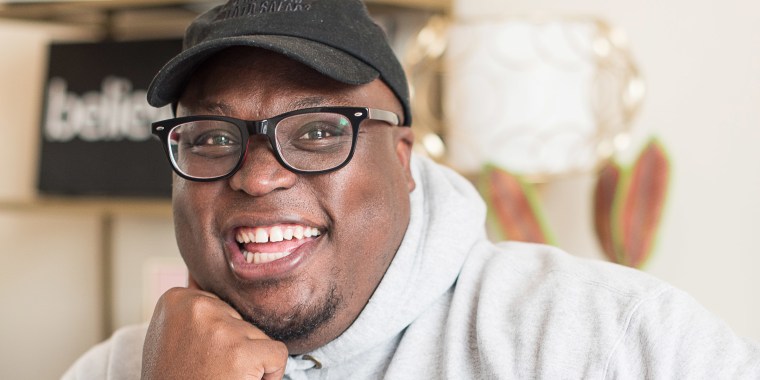It all started with a delicious pot of red rice at his Aunt Shirley’s house.
Before he was known for his Black food facts, KJ Kearney was a Democratic candidate vying for a spot in South Carolina's House of Representatives. In 2018, two years after his loss, he merged his love for rice, his Gullah-Geechee heritage and political advocacy in one proclamation.
“In South Carolina, we have a holiday called Confederate Memorial Day,” Kearney told TODAY Food. “My mind frame is how do we make change without being overt about it. I thought, what I'm going to do is write a new holiday.”
On a July afternoon, in under 40 minutes, he drafted the document. Upon its approval two months later, Sept. 29, 2018 was officially known as Red Rice Day. Subverting the legacy of the Confederacy in Charleston, once the epicenter of the United States’ slave trade, Kearney’s Red Rice Day proclamation uplifts Gullah-Geechee culture and acknowledges the legacy of rice cultivation practiced by enslaved Africans.
Now, the North Charleston native has a following of over 67,000 on TikTok and almost 20,000 on his Instagram page @blackfoodfridays. Kearney, 37, initially avoided TikTok, but after joining in November, his profile “blew up” in two weeks. As an educator at North Charleston Creative Arts Elementary School, Kearney enlightens viewers about Black food history and showcases new Black-owned businesses to support weekly.
Going viral with purpose
Growing up, Kearney was the kid who read the entire encyclopedia. A self-described nerd, he has always found joy in writing and introducing people to things they are unfamiliar with.
“Black history is American history,” he said. “Black Food Fridays drives the fact home that a lot of the stuff we take for granted was created by Black people. When someone watches my videos, the feeling or emotion that I want them to walk away with is, ‘Huh, I didn’t know that!’”
On April 5, Kearney started the Black Food Fridays Instagram in an effort to bolster Black-owned food and beverage businesses as they fight to survive amid COVID-19. According to CNBC, data from the Paycheck Protection Program shows that white business owners were some of the first to receive loans while minority owners didn’t receive them until the last few weeks of the program that ended Aug. 8.
His Instagram page took off during the “June Boom,” after Black Lives Matter protests redirected Americans to buy Black. According to Kearney, from April 5 until May 31, his account had around 1,000 followers. From June to July, it grew to 4,200 and has kept climbing since.
“I wanted to do my part to alert people that there are Black-owned businesses around you that you could be supporting,” he said. “You're talking about being an ally. Let's give you some actionable steps, and food is one of those things that is not divisive for most people. If I get you to (support a Black-owned business) once a month, that's money they're going to receive that they would have never gotten before me.”
'Bigger than me'
With only 60 seconds on TikTok, Kearney thoughtfully explains concepts such as the association between African Americans and cognac brand Hennessy, how a Black man taught Jack Daniel to make whiskey, and the connection between red rice and popular West African jollof rice.
While these platforms “scratch [his] political itch” and will hopefully contribute to Black economic empowerment, Kearney also wants to elevate and amplify Gullah-Geechee culture specifically. The Gullah-Geechee people are descendants of enslaved Africans who, according to the Gullah Geechee Cultural Heritage Corridor Commission, worked “on the rice, indigo, and Sea Island cotton plantations of the lower Atlantic coast.”
Raised in the Gullah-Geechee Cultural Heritage Corridor, Kearney noticed tourists’ fascination with Charleston cuisine. But it was only after attending college at South Carolina State University did he realize how special his culture was.
“It's not a dead language; we are very much here. We're very much alive," said Kearney. "There is so much power in knowing what your ancestors have done and what other people in the diaspora are doing. It gives you the sense that, ‘Oh, I'm a part of this thing that's bigger than me.’”
His hope is that Black Food Fridays is creating a space on social media where people are OK with failure. Rather than observing from the sidelines, he wants allies to get used to failing so that they get used to trying — and eventually learn more and educate others.
Elevating Black food
A Red Rice Day 2021 celebration is in the works, but Kearney’s ultimate goal is to have his own television show, similar to a food version of W. Kamau Bell’s “United Shades of America” or “Adam Ruins Everything.”
“What that will do, subconsciously, is put Black food at the same level as everybody else's," said Kearney. "All these shows travel the world and they elevate other people's cuisines. Yet, in our own country, there's never been a show dedicated to doing the same for our stuff."
"If you have an idea and you think it's going to bring value to people and it's going to scratch any itch that's within you, put the content out," he continued. "You never know who's going to watch it and take hold of it."


